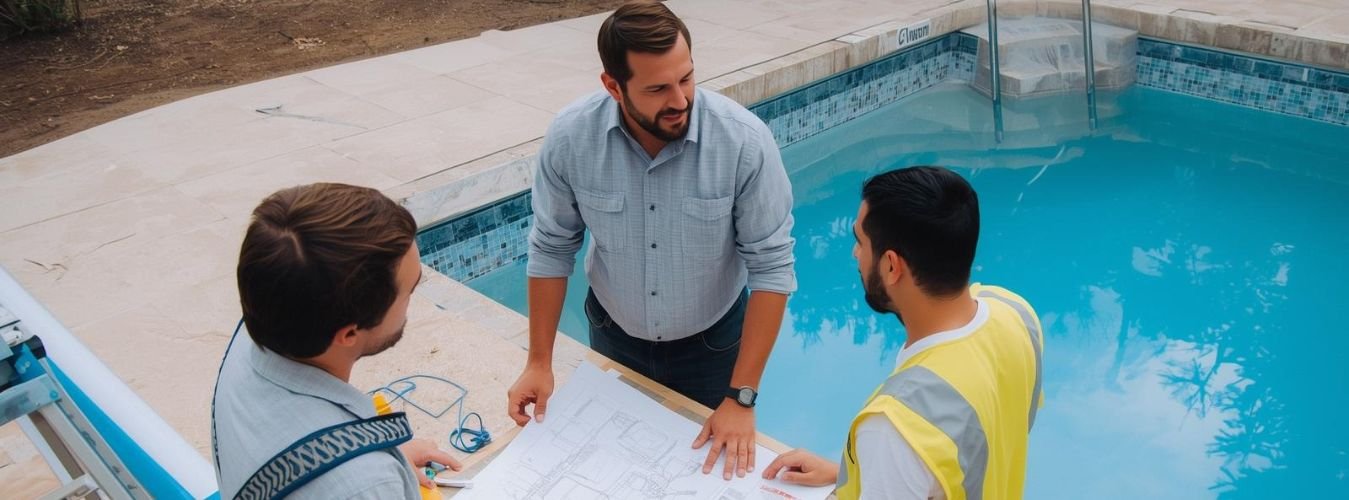By Henri Pera, co-founder of Aqua Elite Pools™
There’s something deeply vulnerable about sitting across from a contractor with a $90,000 decision hanging in the air.
You’ve scrolled through hundreds of pool photos. You’ve watched the YouTube tours. You’ve calculated the ROI at 2 AM when you couldn’t sleep because your neighbor just finished their renovation and now every weekend cookout happens at their house instead of yours.
But here’s what nobody tells you about this moment: the questions you ask in the next thirty minutes will determine whether you’re swimming next summer or staring at a half-finished hole in your yard while your contractor stops returning calls.
The right questions don’t just protect your investment. They reveal who’s actually sitting across from that table.
Why Most Homeowners Ask the Wrong Questions

Industry data consistently shows that homeowners focus intensely on price comparisons while overlooking the operational indicators that predict project success. This creates a dangerous information gap.
When you ask “how much?” before “how long have you been licensed in Florida?” you’re essentially choosing a surgeon based on their hourly rate rather than their success rate. The stakes feel different when you frame it that way.
The challenge isn’t that homeowners don’t care about quality. It’s that most people have never hired a pool contractor before. You’re making one of the largest purchases of your life with approximately zero experience in evaluating the very thing you’re buying.
Here’s the uncomfortable truth: every contractor you meet will show you beautiful photos. Every single one will promise quality work. And almost all of them genuinely believe they’ll deliver on time and on budget.
The questions that matter are the ones that separate intention from capability.
The Licensing Question Nobody Asks Correctly

“Are you licensed?” is the question everyone knows to ask. But it’s essentially worthless.
Every contractor will say yes. The meaningful question is: “What’s your Florida contractor license number, and which classifications does it cover?”
Then you write that number down and verify it yourself through the Florida Department of Business and Professional Regulation website. You’re looking for three things: active status, no disciplinary actions, and the correct classifications for pool construction.
Recent regulatory reviews indicate that a significant percentage of pool-related complaints involve contractors operating outside their licensed scope of work. This matters because if something goes wrong, your insurance coverage and legal recourse depend entirely on whether the contractor was properly licensed for the specific work they performed.
The follow-up question matters even more: “How long have you held this license?”
A contractor who’s been licensed for six months isn’t inherently unqualified. But they’re statistically more likely to encounter problems they haven’t learned to solve yet. Experience compounds in construction. The contractor who’s navigated 200 projects has encountered and solved problems that contractors on their tenth project haven’t imagined yet.
The Insurance Conversation That Reveals Everything

Ask to see their insurance certificates. Not next week. Not “I’ll email them to you.” Right now, in this meeting.
General liability insurance and workers’ compensation coverage aren’t nice-to-haves. They’re the difference between a workplace accident becoming an insurance claim versus becoming your personal financial catastrophe.
But here’s what separates sophisticated buyers from everyone else: ask about coverage limits. A contractor carrying $1 million in general liability tells you something very different than one carrying $5 million.
Higher limits usually indicate either larger projects, longer operational history, or both. More importantly, they indicate a contractor who’s thought seriously about risk management because those premiums aren’t cheap.
The homeowners who end up in legal disputes almost always skipped this step. They assumed. They trusted. They didn’t verify.
The Portfolio Deep Dive (And What Matters When It Doesn't Exist Yet)

“Can I see photos of your work?” is the obvious question. But what happens when you’re talking to a contractor building their first Orlando projects?
Here’s the uncomfortable truth: a contractor without local portfolio is asking you to take a calculated risk. The question is whether they’re earning that trust through transparency or hiding behind promises.
Ask instead: “What experience do you bring from other markets, and how are you adapting it to Orlando specifically?”
A contractor who’s built luxury pools elsewhere for fifteen years doesn’t suddenly forget construction principles. But they do need to learn Orlando’s permitting quirks, soil conditions, and municipal requirements. What matters is whether they’re learning on your dime or investing in that knowledge before they touch your property.
Ask: “Can you show me comprehensive project documentation from your previous market?” You’re looking for permit records, inspection reports, engineering documents, progress photos during construction. Contractors who maintained detailed systems elsewhere will bring those systems to Orlando. Those who can’t produce documentation probably never had systems to begin with.
Then ask: “How are you building relationships with local engineers, permitting consultants, and subcontractors?” New-to-market contractors who are partnering with established local expertise understand that Orlando isn’t just another pin on their map.
The smart question isn’t whether they have Orlando portfolio yet. It’s whether they’re approaching this market with the humility and preparation that complex construction demands.
The Reference Question That Actually Works

“Can you provide references?” is standard. Everyone says yes. Then they give you their three happiest customers who probably just happen to be their relatives or best friends.
Try this instead: “Can you provide contact information for your last five completed projects in order?”
This removes their ability to cherry-pick. You’re getting a representative sample, not a curated highlight reel. When you call these references, you’re not asking “are you happy?” You’re asking specific operational questions:
Did the project finish on schedule? If not, how was the delay handled?
Were there any surprise costs? How were they communicated?
How did the contractor handle problems that came up during construction?
Would you hire them again? This is the only question that really matters.
That last question cuts through everything. Happy customers who wouldn’t hire the same contractor again are telling you something important even if they won’t say it directly.
The Timeline Conversation Nobody Wants to Have
“How long will this take?” seems straightforward. The answer is always more complicated than you want it to be.
Municipal permitting timelines in Orange County can vary significantly based on current application volume and the complexity of your project. Add HOA approvals if applicable, and suddenly that “12-week project” needs 8 weeks of approvals before work even begins.
The contractors who pad their timelines aren’t being pessimistic. They’re being honest about variables outside their control.
Ask: “What’s your typical timeline from contract signing to completion, and what factors could extend that timeline?”
Then ask the question that makes contractors uncomfortable: “What happens if you miss the completion date?”
Their reaction tells you everything. Contractors confident in their project management will have a clear answer. Vague responses or defensiveness suggest they miss deadlines regularly enough that they’ve gotten comfortable with it.
The Payment Structure That Protects Both Parties

Payment schedules should align with project milestones, not contractor cash flow needs. Florida law provides specific guidance on construction payment structures, and for good reason. Contractors asking for more than 10% upfront or demanding payment in advance of work completed are raising red flags.
A typical payment structure might include: deposit at contract signing, payment at excavation completion, payment at shell completion, payment at equipment installation, and final payment at completion and inspection.
Notice what’s not included: a massive upfront payment that gives you zero leverage if things go wrong.
Ask: “What’s your payment schedule, and how does it correspond to project milestones?”
Then ask: “What happens to my deposit if you’re unable to complete the project?”
Reputable contractors carry surety bonds specifically to protect against this scenario. If that question makes them uncomfortable, you’ve learned something valuable.
The Subcontractor Clarity You're Owed
“Do you use subcontractors?” isn’t judgmental. It’s practical.
Most pool contractors subcontract at least some work – electrical, plumbing, perhaps decking or landscaping. This isn’t a problem. It’s standard industry practice.
The problem is when contractors are vague about who’s actually doing the work and whether those subcontractors carry their own insurance and licensing.
Ask: “Which portions of the work do you subcontract, and can you provide me with those subcontractors’ license and insurance information?”
You’re establishing a clear chain of responsibility. If the electrician they hire creates a code violation, you want to know that electrician was properly licensed and insured. Otherwise, guess whose problem it becomes?
The Communication Expectations That Prevent Disasters
Ask: “Who will be my primary point of contact during the project, and what’s a reasonable response time if I have questions or concerns?”
Construction projects generate questions. Will I talk to you directly or to a project manager? If it’s a project manager, am I meeting them today or discovering them later?
The contractors who’ve refined their communication systems will answer this specifically: “You’ll receive photo updates every Tuesday and Thursday. Your project manager will return calls within 4 business hours. Here’s their direct number.”
Vague answers like “we’ll stay in touch” or “you can call anytime” sound reassuring but mean nothing when you’re trying to reach someone during your lunch break and nobody’s answering.
The Warranty Conversation That Reveals Confidence
Warranties in pool construction are not standardized. They vary dramatically by contractor, and the details matter more than the duration.
Ask: “What specific warranties do you provide on labor and materials, and what do they actually cover?”
Then ask: “What’s not covered?”
That second question is where you learn whether you’re talking to someone confident in their work or someone protecting themselves from accountability.
Structural warranties, equipment warranties, and finish warranties should all be addressed separately because they cover different timeframes and different potential issues.
Contractors who’ve been in business for decades tend to offer stronger warranties because they know their work holds up. Contractors who’ve been around for three years and offer lifetime warranties are either exceptional or don’t plan to be around when that warranty gets called.
The Question About Previous Complaints
This one requires courage, but it’s worth asking: “Have you ever had complaints filed against your license, and if so, how were they resolved?”
Ethical contractors will address this directly. Everyone occasionally has an unhappy customer. Projects are complex. Miscommunications happen. Materials sometimes fail unexpectedly.
What matters is how complaints get resolved. A contractor who explains that they had one complaint three years ago, describes what went wrong, and explains how they made it right is demonstrating accountability.
A contractor who claims they’ve never had a single unhappy customer in fifteen years is either lying or working at a scale so small that they’ve completed about nine projects total.
You can verify complaint history through the Florida DBPR website. Do this regardless of what they tell you.
The Orlando-Specific Questions That Demonstrate Local Expertise
Ask: “How do you handle the specific permitting requirements in my municipality?”
Orange County, Winter Park, Windermere, and other Orlando-area municipalities each maintain distinct permitting processes and building code requirements. A contractor who works regularly in your area will answer this specifically. One who doesn’t will answer generally.
Then ask: “What soil conditions are typical in my neighborhood, and how does that affect the construction approach?”
Orlando’s soil composition varies significantly by area. Some neighborhoods sit on sand. Others have clay. Some have high water tables. This affects excavation methods, drainage solutions, and structural approach.
A contractor familiar with your specific area knows these details instinctively because they’ve built there before. A contractor learning this on your project is going to encounter expensive surprises.
The Permitting Question That Saves Months
Ask: “Will you handle all permit applications, and is permitting included in your quote?”
Then ask: “What’s your typical permitting timeline, and what could cause delays?”
Some contractors include permitting in their project scope. Others expect you to handle it. Neither approach is inherently wrong, but you need to know which scenario you’re in before you sign a contract.
Permitting delays are one of the most common causes of project timeline extensions. A contractor who’s worked through the permitting process hundreds of times has relationships with plan reviewers and knows how to structure applications to minimize back-and-forth revisions.
The Post-Completion Support Question
Ask: “What kind of support do you provide after the project is complete?”
Pool ownership involves a learning curve. You’re about to become responsible for equipment, water chemistry, seasonal maintenance, and various systems you’ve never dealt with before.
Contractors who provide comprehensive handoff training, written operating instructions, and responsive post-completion support make your first year of ownership dramatically easier.
Contractors who finish the project, collect final payment, and disappear make that first year unnecessarily difficult.
What These Questions Reveal About You
Here’s something worth considering: contractors are evaluating you as much as you’re evaluating them.
Asking sophisticated questions signals that you’re a serious buyer who’s done research and thinks critically about complex projects. This tends to attract contractors who operate at a higher level because they’re looking for clients who appreciate quality work.
Asking only about price signals that you’re primarily motivated by finding the lowest cost option. This attracts contractors who compete on price, which often means cutting corners somewhere you won’t notice until later.
The questions you ask shape the contractors who want to work with you.
The Question About Their Proudest Project
Try this: “What’s a project you’re particularly proud of, and why?”
Their answer reveals what they value. If they talk about overcoming technical challenges, they’re probably process-oriented. If they talk about the client’s reaction, they’re probably relationship-focused. If they talk about winning awards, they’re probably aesthetics-driven.
None of these are wrong. But you want to know which type of contractor you’re hiring because it affects how they’ll approach your project.
The Closing Question That Changes Everything
After you’ve asked everything else, try this: “Why should I hire you instead of your competitors?”
Their answer won’t tell you if they’re the right contractor. But it will tell you how they think about their work, their differentiation, and their value proposition.
Contractors who fumble this question probably haven’t thought deeply about what makes them different. Contractors who answer it confidently and specifically have likely refined their approach through experience and reflection.
What Separates Aqua Elite Pools™ From Standard Conversations
These questions matter because they reveal truth through pressure. But here’s what you should know about how we approach these conversations:
Our contracts specify milestone-based payment schedules aligned with Florida construction law. Our warranties are detailed and specific because we’ve built hundreds of projects and we know exactly how our work performs over time.
We establish communication protocols including photo update frequency and response time expectations.
We explain our subcontractor relationships transparently because we only work with licensed, insured professionals whose work we’ll warranty as if it were our own.
This isn’t about having the right answers to your questions. It’s about operating at a level where these questions don’t create discomfort because we’ve already built the systems that make the answers obvious.
The Conversation That Actually Matters
The best question you can ask isn’t on this list. It’s the one that comes from your specific situation, your particular concerns, your unique property challenges.
The contractors worth hiring welcome difficult questions because they’ve built their businesses on transparency rather than obscurity.
The wrong contractor will make you feel demanding for asking these questions. The right contractor will respect you for asking them.
Three months into your project, when challenges emerge – and they always do – you’ll be grateful you spent this meeting asking uncomfortable questions instead of comfortable ones.
Because here’s what experience teaches: the contractors who confidently answer difficult questions before the contract tend to confidently solve difficult problems during the project.
And that confidence, built on competence and refined through hundreds of projects, is ultimately what you’re paying for.
